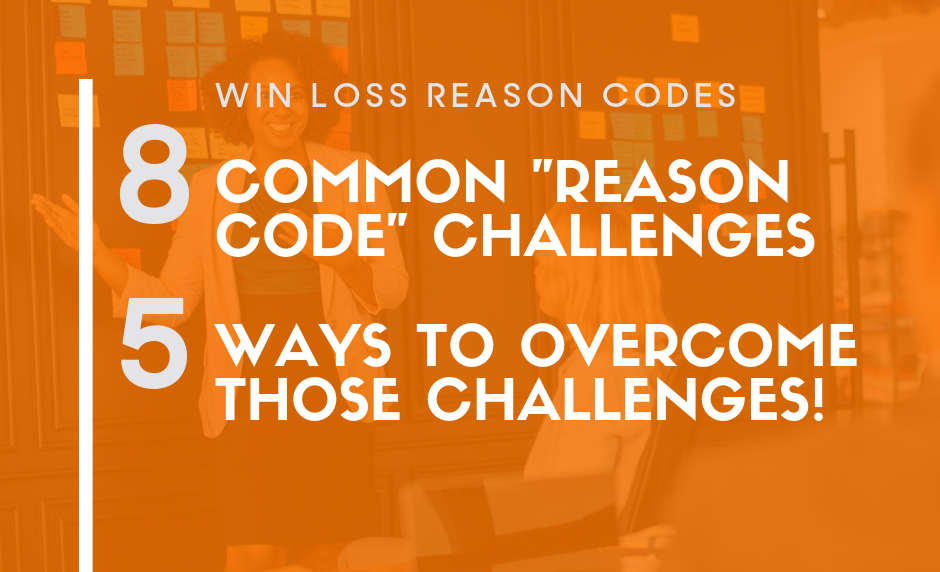Reason Code Utopia.... Does it Exist?
Your company is having a great year, but you know that to remain competitive and maintain this upward trajectory, an increase in your win rate is vital. As a product marketer, you know you can help. You begin by researching why you’re winning some deals and losing others. Not a problem, you think to yourself. I can just pull the reason code data from our CRM. That’ll tell me everything I need to know!
Beep, beep, beep...
Just at that moment, your alarm goes off, and you realize that you were dreaming. After all, you know your reason code data is a mess. As you finish your Cheerios and head to the office, you have a sinking feeling that what awaits you is a day full of frustration, born from the unreliable reason code data that you surely face. Ugh. What to do?
We at DoubleCheck Research often hear our customers bemoan the headache of unhelpful, confusing, or even downright useless reason codes. So we sent our analysts out to identify the most common challenges that prevent good organizations from having a sound approach to reason codes. We also took a look at how lessons from more advanced organizations can help you change your reason codes from awful to awesome, upping your overall win/loss analysis game.
During our research, we gathered reason codes from close to 20 midsize business-to-business (B2B) technology and service providers. What we found was astonishing. Some providers were using well under 10 codes, while others had north of 50. That’s right—50!
So what’s the right approach? Let’s start off with the challenges.
Why Your Reason Codes Lack Awesome Sauce
It turns out that there are eight common issues that prevent most organizations’ reason codes from being considered a trusted source of insight.
😱 They’re Not Reliable
Often, the data generated from a reason code report is unreliable. The main culprit is sales making the wrong selection, since they really don’t know the true reason why they won or lost, yet they have to make a selection to close the opportunity in the system. To make matters worse, there is nobody qualifying those selections made by sales or asking the buyer for their perspective, further perpetuating the problem.
🚦 They're Not Required
On the flip side, some organizations choose not to require their salespeople to select a reason code. This approach lets the sales team off the hook, making it very easy to skip this step completely, whether they know the reason or not.
🌫️ They're Too Vague
Have you read your reason codes lately? We found that some are a little bit too broad. Sure, we get it—selecting "loss to a competitor" paints a picture, but not a very insightful one. Unless there's another check and balance in place to dig deeper, vague reason codes may provide you with a whole lot of nothing.
🐚 They're Pretty Old
Do your codes reflect your current selling environment, or are they a glimpse into the past? As the market shifts and your offering evolves, don't leave your reason codes behind. After all, outdated codes are likely to lead to irrelevant data.
👯 They're Twins
It's important to weed out any codes that sound too similar and ensure that adequate differentiation is present. Otherwise, a problem may occur come selection time, leaving the sales reps to wonder, "Which one best fits the situation?"
👐 They Lack Weight
Some companies restrict sales reps to a single reason code when there may be multiple reasons for a win or loss. Others allow for the option to select multiple. The more the merrier, sure, but what happens when reps can't rank-order their choices? Here's what: The codes appear as having equally affected the outcome when they certainly did not. This can skew the overall results and lead to a less important response being prioritized.
🙅 They're Too Limited
While it may pain us to admit it, our salespeople often have no idea why they won or lost an opportunity. This becomes quite a big issue when an organization does not provide an option such as "I don't know." Maybe there is an "other" option, but "other" is quite different than "I don't know." In conducting this research, one of our favorite reason codes was "I was outsold"!
👉 They Lack Purpose
Does each of your reason codes align with a code owner who can act upon the results? If a salesperson selects "lost due to price," is someone responsible for pricing notified? Does any further discovery take place? We heard from many organizations that there was not a consistent method for reviewing reason codes, following up with sales, or taking action to confirm accuracy or change inaccurate code selections.
Do you find your organization stumbling with an ineffective reason code strategy and useless win/loss data? Rest assured, you're not alone.
So let's dig deep into the ways technology providers have turned awful into awesome with some solutions that will cure your reason code woes.
Fix Your Reason Codes to Boost the Value of Your Win/Loss Data
If your reason codes are stale, suspect, or simply non-existent, fear not. The more advanced organizations we spoke with pointed to this clear, five-step path to improving your reason codes and reaping the rewards of higher-quality win/loss insight.
🔨 (Re)Create Them
Don't have reason codes in your CRM system just yet, or need a total revamp? Then let's start with a survey. Ask your sales team to identify what they believe are the usual reasons behind winning or losing a deal. Is it solution gaps, a competitor with a stronger story, or maybe a failed proof of concept? Use this exercise as the foundation of your reason code creation (or recreation) process.
📝 Define Them
Now that you have a sales-attested list of reason codes, ensure that each has a corresponding definition. Clearly defined reason codes will lead to data quality improvements. Take the time to assign definitions to completely negate any chances of your sales reps not properly understanding the meaning of a reason code, selecting one erroneously, and thus compromising your win/loss dataset. Don't forget to train new hires on your reason codes and definitions during their new hire on-boarding process, and reinforce, reinforce, reinforce until the cows come home.
🔈 Communicate Their Purpose
No one likes to hear "Because I said so" as a reason to do something, whether it's cleaning out the garage, folding laundry, or selecting reason codes when closing out a deal. Knowing the motivations and benefits behind a task can increase process adoption. Let sales know what your organization plans on doing with the data collected and of any expected outcomes. More importantly, let the sales team know exactly how it's going to positively and personally impact them and ultimately make them more successful. And when the time is right, show the sales team how their contributions are making a difference to the quality of the win/loss data being collected. After all, without that quality data, it can be much, much harder to drive any actions that will improve your solution, your marketing investments, and your sales enablement efforts.
🚩 Hold Everyone Accountable
This step doesn't apply to your sales representative alone. Ensure that all sales managers are reviewing reason code entries for accuracy and keeping their team members to task. This means everyone will understand that selecting reason codes at the end of the sales process is not optional, but required. If possible, enforce this step in your CRM system: If no reason codes are selected, then a sales rep can't close out that deal.
That said, do not force the salesperson to select a reason code if they truly don't know the reason. Give them an "I'm not sure" option. Whichever option you provide, make sure that the salesperson knows it's alright to not know, otherwise they will pick another option out of fear of being shamed.
🖼️ Eyes on the Bigger Picture
Consider adding a crucial and differentiating feature to your CRM: a checkbox that enables your sales team to nominate a deal for further investigation. Going deeper into the reasons behind the win or loss, either via an online survey, or maybe even a post-sale (or post-mortem) interview with the buyer, may provide sales team members with a massive amount of insight into their own sales techniques that they wouldn't have gained otherwise. Digging deeper may also lead to the discovery of key findings—on product, market chatter, or competitive intelligence—that could help improve other areas within your organization, not just sales.
Next Stop: Win/Loss Program Success, Courtesy of Rock-Solid Reason Codes
You knew the problems, but now you know the solutions to ensuring that your reason codes make significant contributions to your win/loss analysis program. By employing the strategies outlined here you are on your way to reaping the benefits of win/loss program success.
Did you enjoy this blog article? Check out some of our other awesome content.
Become a DoubleCheck Insider!


